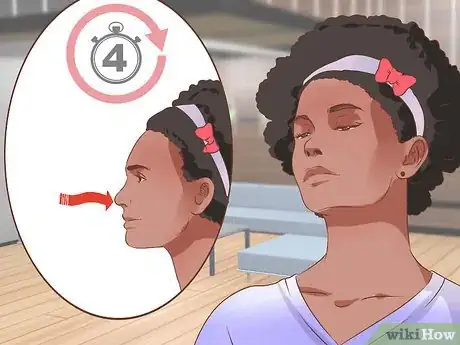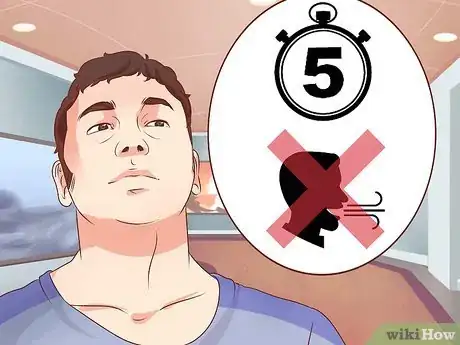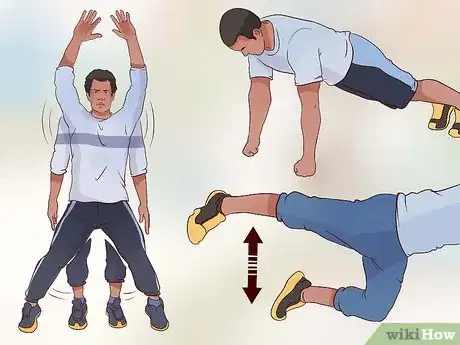This article was co-authored by Trudi Griffin, LPC, MS. Trudi Griffin is a Licensed Professional Counselor in Wisconsin specializing in Addictions and Mental Health. She provides therapy to people who struggle with addictions, mental health, and trauma in community health settings and private practice. She received her MS in Clinical Mental Health Counseling from Marquette University in 2011.
There are 26 references cited in this article, which can be found at the bottom of the page.
This article has been viewed 33,655 times.
Anger and hurt are common responses to emotional pain. Reacting immediately following emotional injury often results in regret. A better option is to calm down before responding to the offending party. There are many ways that you can help yourself feel better in the moment.
Steps
Breathing Deeply
-
1Stop the stress response in its tracks. When you are angered, upset, or hurt, your body may go into "fight or flight" mode.[1] Your sympathetic nervous system revs up as a survival instinct, accelerating your heart rate, constricting your blood flow, raising your blood pressure, and making your breathing shallow and rapid.[2] Breathing from your belly, or "diaphragmatic breathing," will help you quell these stress responses and feel calmer fast.
- When your breathing is rapid and shallow, you don't get enough oxygen, which can make you feel like it's difficult to breathe. It can also cause feelings of stress or anxiety.[3]
- Deep breathing on a regular basis can also help you deal with stress, anger, and other strong emotions on a regular basis. Deep breathing exercises can actually help retrain your body's immediate response to stress and keep it from going into "fight or flight" mode in the first place.[4]
-
2Get comfortable. Sit, lie, or stand in a comfortable position that allows you to breathe without restriction. Sitting or lying down are usually the best options, but the exercise can be done standing as well.
- If you choose to sit or stand, pay attention to your posture, as slouching may limit your ability to inhale deeply.
- If you can, loosen tight clothing or belts to help you breathe better.
Advertisement -
3Inhale through your nose for a count of four. Counting slowly, silently, will help to ensure you are breathing deeply and also help you to focus on something other than your pain.
- Placing one hand on your chest and the other below your rib cage will help you to become more physically aware of your breath.[5] You should feel your belly rise as you inhale.
-
4Hold your breath for a count of five. If you aren't able to comfortably hold a breath for this long, try reducing the hold to a count of three. The goal is to maintain awareness of your breathing; this isn't a contest. Find the most comfortable rhythm for you.
- Holding your breath for a few seconds will also help prevent over-breathing, which may leave you feeling dizzy or light-headed.[6]
-
5Exhale through your mouth for a count of six. This step often takes a few tries to master. Again, remember this isn't a contest. Find what is most comfortable for you.
- If you are having a hard time exhaling slowly, try pursing your lips, or hissing, for better control.[7]
- If you don't exhale quickly enough to empty your lungs in six seconds, try relaxing your mouth a little.
-
6Continue breathing deeply for at least 10 minutes. It's important to give yourself time to establish a rhythm. Regular practice can help develop this skill.[8]
- If you are having difficulty focusing on your breathing, try practicing activities that require controlled exhalation, such as:
- Blowing up balloons
- Blowing bubbles with liquid soap
- Blowing a feather across a room
- If you are having difficulty focusing on your breathing, try practicing activities that require controlled exhalation, such as:
Taking a Break
-
1Remove yourself from the situation. Tell others you need to take some time to yourself. You can say something such as "I'm feeling a little overwhelmed right now. I need to take a short break." If you're in the middle of an argument or fight, it can be helpful to say that you will return to continue the discussion later: "I need to take a break right now. Let's regroup in 30 minutes to discuss this further, when I feel calmer."
- If others are insistent you not leave, explain that you need time to process your feelings and plan to share those with them soon.
- Walking away without an explanation may lead some to be concerned or offended. It's best to be polite and communicative to prevent confounding the problem.
-
2Do something you enjoy. Distracting yourself helps you manage your emotions because it's very hard for your brain to focus on more than one thing at a time. As it turns out, humans aren't very good multi-taskers.[9] You can feel more than one emotion at once, but it is difficult for you to focus on actively experiencing more than one at once.[10] When you feel hurt or angry after being hurt, you can engage in a favorite pastime, work on a puzzle, play a game on your phone, play with your pet, or chat with a friend.
- With practice, you will become more adept at diverting attention away from stressors and focusing on enjoyable distractions.
-
3
-
4Try humor. Humor can help defuse anger, especially if it's silly or ridiculous humor.[15] [16] Try going to another room and watching a funny video or looking up your favorite comedian's Twitter account.
- Looking at images of kittens or puppies (or your favorite baby animal) on your computer or smartphone may help. Scientists have found that cute baby animals trigger a protective instinct in us that makes us feel happy. Just be aware: this protective instinct can also make you feel more aggressive (have you ever wanted to give an adorable puppy a big squeeze?). See if this tactic works for you.[17]
-
5Continue the distracting activity until you no longer feel angry. This may take some time, so plan to be engaged for at least 20 minutes.
- When you interact with the offending party again, gauge the intensity of your emotions. If you quickly become distraught, take more time to yourself.
- In some cases, it may take days before you are calm enough to revisit the source of your pain.
- Sleeping on it for a couple of nights may help, as quality sleep may improve regulation of emotion. [18]
-
6Try positive self-talk. One of the things that can make it hard to calm down is feeling like we "should" or "shouldn't" be experiencing the feelings that we are. You might feel angry with yourself for feeling angry, which creates a vicious feedback loop that keeps you from calming down. Instead, try some positive self-talk to remind yourself that you're going to be okay.[19]
- Don't try to repress your feelings. Instead, acknowledge them to yourself: "I am feeling angry because my boss said something really hurtful to me. This is a natural response. It isn't pleasant, but it will pass."
- You can also try to acknowledge cognitive distortions, or unhelpful thought habits, to yourself. For example, you might be filtering, or magnifying the negative aspects of an experience to yourself. You could say to yourself, "I am feeling overwhelmed right now because it feels like my boss didn't notice all of my hard work and just picked on my mistakes. I may not have a full grasp of the situation right now. I can talk to her about it when I feel calmer."
- You can also remind yourself that you're strong and can get through this moment of hurt by saying something like: "This really hurts right now, but I have made it through being hurt before. I am strong and I can remain calm."
Reappraising the Situation
-
1Call or visit an uninvolved friend or loved one. Talking with someone who is not privy to the circumstances of the painful incident will allow you to share your feelings, without being defensive.
- Each person involved will share a different account of events. Sharing with an uninvolved party will ensure your version is told.
- This will also create the need to clarify some aspects for the listener and, in doing so, will help you to clarify your understanding of the events.
-
2Focus on why you feel hurt. Being emotionally hurt leaves us feeling vulnerable. Conveying why you feel a particular way to someone who cares about you will create empathy and help you to feel safe.[20]
- In this safer environment, you will be able to further explore the source of your pain and generate new insight.
-
3Ask for feedback. After you finish telling your story, tell the listener you want to approach the situation rationally. Ask how he or she would handle the situation. This will provide opportunities for cognitive reappraisal and rehearsal for reengaging with the person who hurt you.
- Cognitive reappraisal is thinking about a situation differently. Changing the way you think about an event may also change the way you feel about it.[21]
- A common cognitive distortion is jumping to conclusions. For example, imagine that you feel angry because someone just cut you off in traffic. Your immediate response might be "What a selfish jerk! He doesn't care about anyone!" even though you only have that single experience (and only your side of it) as "evidence" for this conclusion. Cognitive reappraisal asks you to consider the other possibilities about this situation. Maybe the driver was having a bad day and not paying as much attention as he usually does. Maybe he truly didn't see you and would have felt bad about cutting you off if he had. Maybe he was rushing home to take his child to a doctor's appointment. The point here is not to react as though you know everything about the situation, but to remind yourself that there are many ways of thinking about things.
- Another common distortion is personalization, or making things about us that aren't. We may feel hurt when we personalize. For example, you might interpret a teacher's comment that your daughter is not doing well in school as a personal attack on you as a parent. This could lead to you feeling angry and hurt. Instead, reappraise the situation and ask yourself what you actually know, rather than what you're assuming. Maybe the teacher's comment actually reflects her confidence in your parenting skills and she thinks you can help your daughter! Ideally, in these situations it's good to reserve judgment and clarify with the other person what s/he meant.
- If you and the listener feel comfortable enough, role playing is a great way to practice responding calmly; this may help you feel more prepared and confident when you next encounter the person who hurt you.
-
4Write it down. If a friend isn't available or you would like to organize your thoughts before sharing them with others, try journaling. Journaling can also provide the opportunity for reflection after discussing your feelings with another.
- Carry a journal and pen/pencil. We usually aren't prepared to be emotionally hurt, so having a journal in your backpack or handbag is a good idea. If you don't like the idea of having a journal, you can write on loose paper and destroy it after you finish.
- Excuse yourself from the situation. Politely tell others you need to take a moment to process your feelings, and find a quiet place to sit.
- Write about why the behavior hurt you. Strong reactions to another's behavior are most often about perceived motivation or emotional representations of the behavior. Writing about why you are hurt by a behavior will help you better understand your emotional reaction and more effectively communicate your feelings to others.[22]
- For slight grievances, writing your feelings down is often all it takes to release the negative emotions you are experiencing.[23]
- If you find it difficult starting your writing, try creating a table.
- Draw a vertical line down the center of the paper.
- List the offensive act on the left side of the page.
- On the right, explain why that act hurts you.
- Reflect on the actions you can take to help you feel better. For example, maybe you just want to ignore this person and move on. Or maybe you would feel better if you have a chat with the person after you've calmed down. Noting a couple of concrete things you can do to resolve the hurt will help you stop fixating on it, which will help you calm down.
Resolving Conflict
-
1Reengage with the person who hurt you. Once you have calmed down, initiate communication with the person who has offended you. This may be done in person or by phone, email or text.
- If you feel you may easily lose control of your emotions, it may be best to communicate in writing; this will allow you time to carefully choose your words and edit your responses.
-
2Share how you are feeling. Expressing how you feel first allows you to naturally communicate using I-statements. I-statements may reduce the likelihood of the listener responding defensively.[24]
- The beginning of the statement should be "I feel."
- For example, "I feel hurt when you point out all of my mistakes in front of my coworkers. I feel like you're saying my work has no value to the team."
-
3Identify the specific action that provoked your emotional reaction. The other person may be unaware of what triggered your reaction. The "fundamental attribution error" is a pattern of thinking that happens with most people from time to time, in which they attribute responses to an internal, individual characteristic rather than an external one.[25] So, for example, your boss might see your emotional reaction as you simply being a "touchy" person, rather than the reaction as a response to something she did or said.
- An action you perceive as deeply offensive may also be perceived as benign by another. For example, if you felt hurt because your partner was late to a date, you could remind yourself that lateness is a culturally defined thing. For example, someone from an Italian cultural upbringing may not see being 10 minutes late to an agreed time as actually being not punctual, where someone from a German cultural upbringing may see even arriving right on time as being "late."[26]
-
4Explain why the action triggered your emotional reaction. This may involve disclosing personal history, explaining social dynamics, or sharing cultural expectations.
- Journaling and/or talking with others may help you discover why you were hurt by the action, as it may not be immediately evident.
-
5Ask the person who hurt you to acknowledge and understand your pain. Often, understanding and support is all that is required to resolve conflict.[27]
- Try phrasing this as a need to be heard.
-
6Discuss ways to behave more appropriately in similar situations in the future. Identifying appropriate ways to modify future behavior will help to avoid future conflict.
- Explore all possible behavioral responses to identify the options that best benefit all parties.
- This discussion needs to involve coping strategies and plans for future communication on your part to be effective.
- You are ultimately responsible for your emotions, so you must also modify your behavior.
Warnings
- If you feel you may become violent, leave the area and avoid contact with others until you have regained control over your emotions.⧼thumbs_response⧽
- Avoid using drugs and alcohol, as they may make the situation worse.⧼thumbs_response⧽
- Avoid hitting or destroying property. You may cause unintentional physical harm to yourself and/or others and/or be subject to legal action.⧼thumbs_response⧽
- Avoid using accusatory language when discussing your feelings with the person who hurt you. Doing so will likely only further the conflict.⧼thumbs_response⧽
References
- ↑ http://www.health.harvard.edu/mind-and-mood/relaxation-techniques-breath-control-helps-quell-errant-stress-response
- ↑ http://www.medicinenet.com/script/main/art.asp?articlekey=5607
- ↑ http://www.health.harvard.edu/mind-and-mood/relaxation-techniques-breath-control-helps-quell-errant-stress-response
- ↑ http://www.npr.org/2010/12/06/131734718/just-breathe-body-has-a-built-in-stress-reliever
- ↑ http://my.clevelandclinic.org/health/diseases_conditions/hic_Understanding_COPD/hic_Pulmonary_Rehabilitation_Is_it_for_You/hic_Diaphragmatic_Breathing
- ↑ https://www.nlm.nih.gov/medlineplus/ency/article/003071.htm
- ↑ https://www.nlm.nih.gov/medlineplus/ency/patientimages/000267.htm
- ↑ https://www.helpguide.org/articles/stress/quick-stress-relief.htm
- ↑ http://www.npr.org/2013/05/10/182861382/the-myth-of-multitasking
- ↑ https://www.goodtherapy.org/learn-about-therapy/issues/emotional-overwhelm
- ↑ http://www.apa.org/monitor/2011/12/exercise.aspx
- ↑ https://my.clevelandclinic.org/health/body/23040-endorphins
- ↑ http://www.adaa.org/living-with-anxiety/managing-anxiety/exercise-stress-and-anxiety
- ↑ https://www.health.harvard.edu/staying-healthy/exercising-to-relax
- ↑ http://www.apa.org/helpcenter/controlling-anger.aspx
- ↑ https://www.helpguide.org/articles/mental-health/laughter-is-the-best-medicine.htm
- ↑ http://www.scientificamerican.com/article/cuteness-inspires-aggression/
- ↑ http://www.cell.com/current-biology/abstract/S0960-9822(11)01248-6?_returnURL=http%3A%2F%2Flinkinghub.elsevier.com%2Fretrieve%2Fpii%2FS0960982211012486%3Fshowall%3Dtrue
- ↑ https://www.waldenu.edu/online-bachelors-programs/bs-in-psychology/resource/how-positive-self-talk-can-make-you-feel-better-and-be-more-productive
- ↑ http://www.beyondintractability.org/essay/empathic-listening
- ↑ http://dept.psych.columbia.edu/~kochsner/pdf/Buhle%20Reapp%20Meta%202013.pdf
- ↑ https://www.urmc.rochester.edu/encyclopedia/content.aspx?ContentTypeID=1&ContentID=4552
- ↑ http://msue.anr.msu.edu/news/journaling_to_reduce_stress
- ↑ http://assets.gcflearnfree.org/topics/28/wp_IstatementWorksheet.pdf
- ↑ http://changingminds.org/explanations/theories/fundamental_attribution_error.htm
- ↑ http://articles.latimes.com/2005/dec/11/travel/tr-insider11
- ↑ http://www.helpguide.org/articles/relationships/conflict-resolution-skills.htm


















































































Medical Disclaimer
The content of this article is not intended to be a substitute for professional medical advice, examination, diagnosis, or treatment. You should always contact your doctor or other qualified healthcare professional before starting, changing, or stopping any kind of health treatment.
Read More...